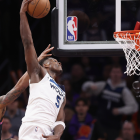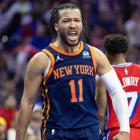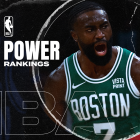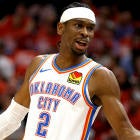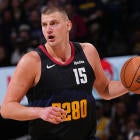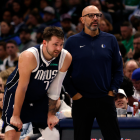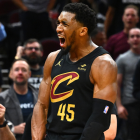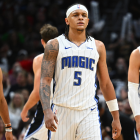The day after the Brooklyn Nets were eliminated from the playoffs, they held end-of-season press availability. This was not a major media event. There was no podium, just players taking turns standing in front of a Nets backdrop with a small group of reporters huddled around.
They talked about the sort of thing you'd expect: how proud they were of making the playoffs, how they wanted to build on that, how much they liked the team culture in Brooklyn. There were a lot of questions about what might happen in the summer, since the front office had salary-cap flexibility.
DeMarre Carroll directly asked reporters to write "good stuff" to help Brooklyn's recruiting efforts. Jared Dudley extolled the virtues of the Nets' coaching staff, management and practice facility. Spencer Dinwiddie delivered a full-fledged pitch, which mentioned that the team sends flowers to players' parents.
"This is a fairy-tale experience, man," Dinwiddie said. "They really care about you. It's easy to come to work every day. It's a joy to come to work every day."
That was March 23, and my takeaway was that, while Brooklyn had set itself up nicely, it wasn't guaranteed anything. Free agency is a dangerous game, and the front office had important decisions to make regarding All-Star point guard D'Angelo Russell, the hefty contract of Allen Crabbe and the free agency of several veterans. It is now June 30, and the Nets' wildest dreams have come true: Kevin Durant and Kyrie Irving will reportedly sign max contracts, the greatest possible validation of what they have built since Sean Marks was hired as general manager in February 2016.
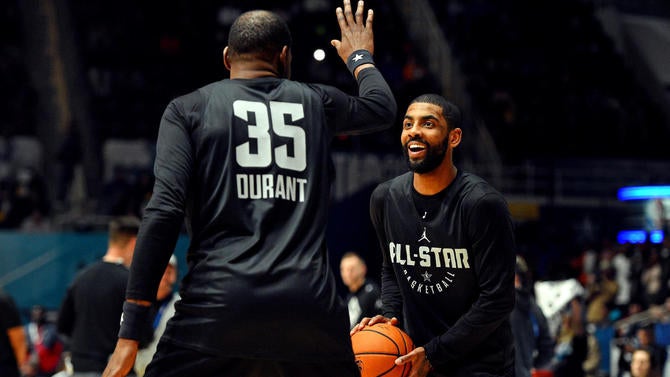
Before Kenny Atkinson's first home playoff game as a head coach, he told Marks that he had expected they'd reach that milestone in Year 5 or 6 together, not Year 3. From now on, the playoffs will be the norm in Brooklyn, and, starting in 2020-21, when Durant returns from his torn Achilles tendon, the Nets will be considered contenders. While there was a bit of boldness -- dumping Crabbe's contract, potentially alienating Russell -- required to pull this off, the gambit was successful because Marks and Atkinson always had a process-oriented mindset. They wanted to operate like a championship-caliber organization even if they were losing 75 percent of their games. From the beginning, they knew they didn't have a roster that could win big, but they wanted to play a style of basketball that could.
Brooklyn was not perfect. The strategy of sending huge offer sheets to young restricted free agents — Crabbe, Tyler Johnson and Otto Porter — could have backfired. There were ill-fated gambles on the likes of Anthony Bennett, Isaiah Whitehead and Archie Goodwin. But the Nets' lack of first-round draft picks forced them to play the margins, taking chances on talent and housing bad contracts in order to get extra picks. They invested in sports science, and the story of them striking gold with Russell, Caris LeVert, Spencer Dinwiddie, Joe Harris and Jarrett Allen has been well-told. A fact that isn't as well-known: They had the opportunity to select center Nicolas Claxton with the No. 31 pick in the draft 10 days ago because they traded Trevor Booker to Philadelphia for Jahlil Okafor and Nik Stauskas in December 2017.
If there is anything to learn from the Nets pulling off one of the greatest coups in the history of free agency, it is the importance of patience, due diligence and stacking good decisions on top of each other. They didn't know this approach would pay off in this fashion, but they tried to incrementally improve, with the belief that it would eventually pay off somehow.

Some people might lament that a big-market team has become a superpower. Another way to look at it, though, is that an incredible underdog has beaten the odds. The Nets are New York's other team, the one that is sponsored by a local grocery chain and the Barbados tourism board, the one you can buy reasonably priced tickets to see. They ascended quietly, while most of the basketball world was not paying attention or merely thought of them as a cute story. Unlike the New York Knicks, who had the same goal heading into the summer, there was no bluster from Brooklyn, as the franchise was wary of raising expectations or appearing overconfident.
In a way, there is symmetry to the Nets' success in free agency and the Toronto Raptors' 2019 championship. Neither was considered anything close to a frontrunner a year ago, and both had an executive who stayed out of the spotlight, made opportunistic moves and bet on his team's infrastructure. It would be incorrect, however, to prematurely celebrate the organizations that did things "the right way" triumphing over those that rely on glitz and glamor. The Los Angeles Lakers used their history and cultural cache to lure LeBron James last summer, and they might be able to convince Kawhi Leonard to play with James and Anthony Davis, creating the best Big 3 the league has ever seen. There are multiple ways to assemble a contender, and, in free agency, you have to sell whatever you can.
What I'll remember most about Brooklyn's end-of-season press conference is Jared Dudley holding court. As much as he talked up the team, the veteran stopped short of suggesting that the Nets were about to have a franchise-changing summer.
"Free agents would definitely consider it," Dudley said. "Now, them picking it, that's where, you know, maybe Brooklyn has a little bit more to do."
No one in Brooklyn thought a huge splash was a certainty, even if the organization was confident in the work it had done and the direction it was headed. Now, with Durant and Irving on the way, it looks like the Nets have been transformed overnight. Like any overnight success story, though, it took years.














